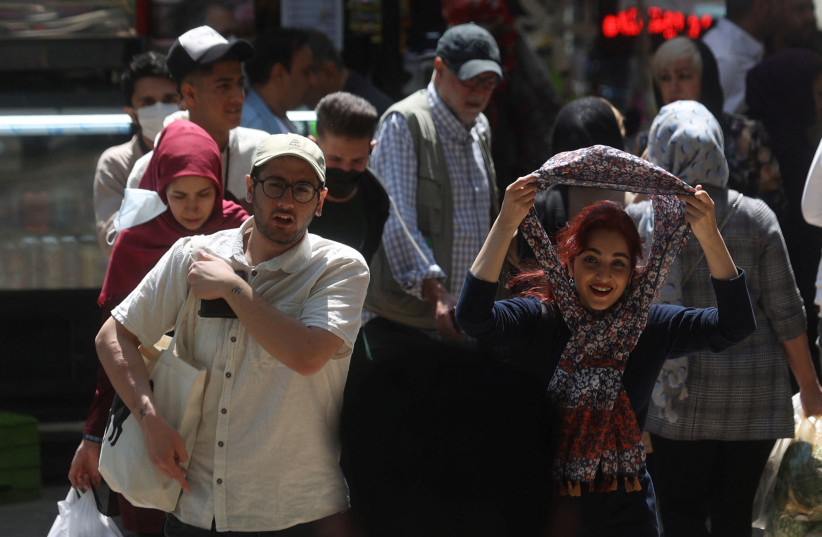A Kurdish-Iranian woman named Roya Heshmati was whipped 74 times after a photo of her was published a few months ago in which she was seen not wearing a hijab in Tehran, Iranian human rights activists reported on Saturday. Heshmati has been an outspoken critic of the Islamic regime’s hijab law.
In an account of the flogging shared by the Kurdish human rights organization Hengaw, Heshmati stated that upon entering the court where the flogging was to take place, she removed her hijab. Although both her lawyer and an employee advised her to put on her headscarf “to avoid trouble,” she recalled that she “came specifically for the lashes, and I would not yield.”
The officer carrying out the flogging told her to put on the hijab, but she refused, even after he threatened to whip her severely and add another 74 lashes to her sentence. “I maintained my stance and did not wear the hijab,” stressed Heshmati.
Eventually, two women came and forcibly placed a scarf on her head, eventually handcuffing her to keep the scarf on.
Heshamti described the room where the sentence was carried out as containing a bed with handcuffs and iron bands welded to both sides, as well as an iron device resembling a large easel which also had handcuffs and an iron binding in the center. “It resembled a fully-equipped medieval torture chamber,” said Heshmati.
Heshmati wrote that she quietly chanted, “In the name of woman, in the name of life, the clothes of slavery are torn, our black night will dawn, and all the whips will be axed... ” as the whipping was carried out. She added that she ensured that her pain was not perceived by those present and that she removed the headscarf as soon as she left the room.
“Inside the judge’s chamber, he acknowledged discomfort with the case but insisted on its implementation. I chose silence. He suggested living abroad for a different life; I affirmed our commitment to resistance, emphasizing the universality of this country. He insisted on legal adherence, and I urged the law to fulfill its role while we persist in our resistance,” wrote Heshmati.

Maziar Tatai, Heshmati’s lawyer, stated that Heshmati was originally arrested and had her phone and laptop confiscated for publishing a picture of herself without the hijab, according to Entekhab, an Iranian reformist news site recently blocked in Iran for criticizing the government.
Tatai added that the Iranian judiciary changed the charges placed against Heshmati several times throughout the process, including charges of “propaganda against the regime,” “being in the streets without a religious hijab,” “harming public modesty,” “producing vulgar content,” and “encouraging people to commit corruption.”
HESHMATI SPENT several days in jail and was issued a prison sentence which was later reduced.
Tatai noted that Heshmati’s flogging took place on Mother’s Day in Iran, marked on the birthday of Fatima Zahra, the daughter of the Prophet Muhammad and the husband of Ali, the first Shia Imam.
The Mizan News Agency, affiliated with Iran’s judiciary, confirmed that Heshmati had been whipped 74 times but stressed that she was not convicted for not wearing a hijab and was instead convicted of “promoting promiscuity” on the streets of Tehran after having received money from an organized movement abroad.
In another recent case, Zeinab (Bahar) Khonyabpour was sentenced to two years in prison for publishing photos in which she was not wearing a hijab, according to the Iranian HRANA human rights organization.
Iran intensifies enforcement of hijab laws
Despite temporarily relaxing enforcement of hijab laws after protests swept Iran in 2022 following the killing of Mahsa Amini, Iranian officials have since renewed their crackdown on women not wearing hijab, introducing new measures, including the use of surveillance cameras to enforce hijab laws.
Amini, a Kurdish-Iranian woman, was arrested by “morality police” officers in Tehran in mid-September of 2022 for allegedly incorrectly wearing her hijab, with her family saying that she was beaten by the officers in the van that brought her to the police station. Amini collapsed at the station and later died at the hospital.
Amini’s death sparked intense nationwide demonstrations, commonly referred to as the “Woman, Life, Liberty” (“Jin, Jiyan, Azadî” in Kurdish) protests, which continued in full strength for months on end.
On Saturday, Mohammad Dehghan, the vice president for legal affairs under Iranian President Ebrahim Raisi, addressed a new bill promoted in the past year by the Iranian government that would intensify the penalties for not wearing the hijab, telling Iran’s IRNA news agency that the bill was given to the parliament by the judiciary, meaning the parliament could not make any major changes to the bill.
Dehghan added that the bill was presented in light of the protests that swept Iran in 2022.
The vice president added that the government had attempted to “dilute” the bill somewhat but was unable to do too much due to it being a bill originating in the judiciary. The bill was sent to the parliament, which made further changes before forwarding it to the Guardian Council, which is tasked with approving any laws passed by the parliament.
The bill has been under review since, with the Guardian Council reportedly presenting numerous objections to the bill.
